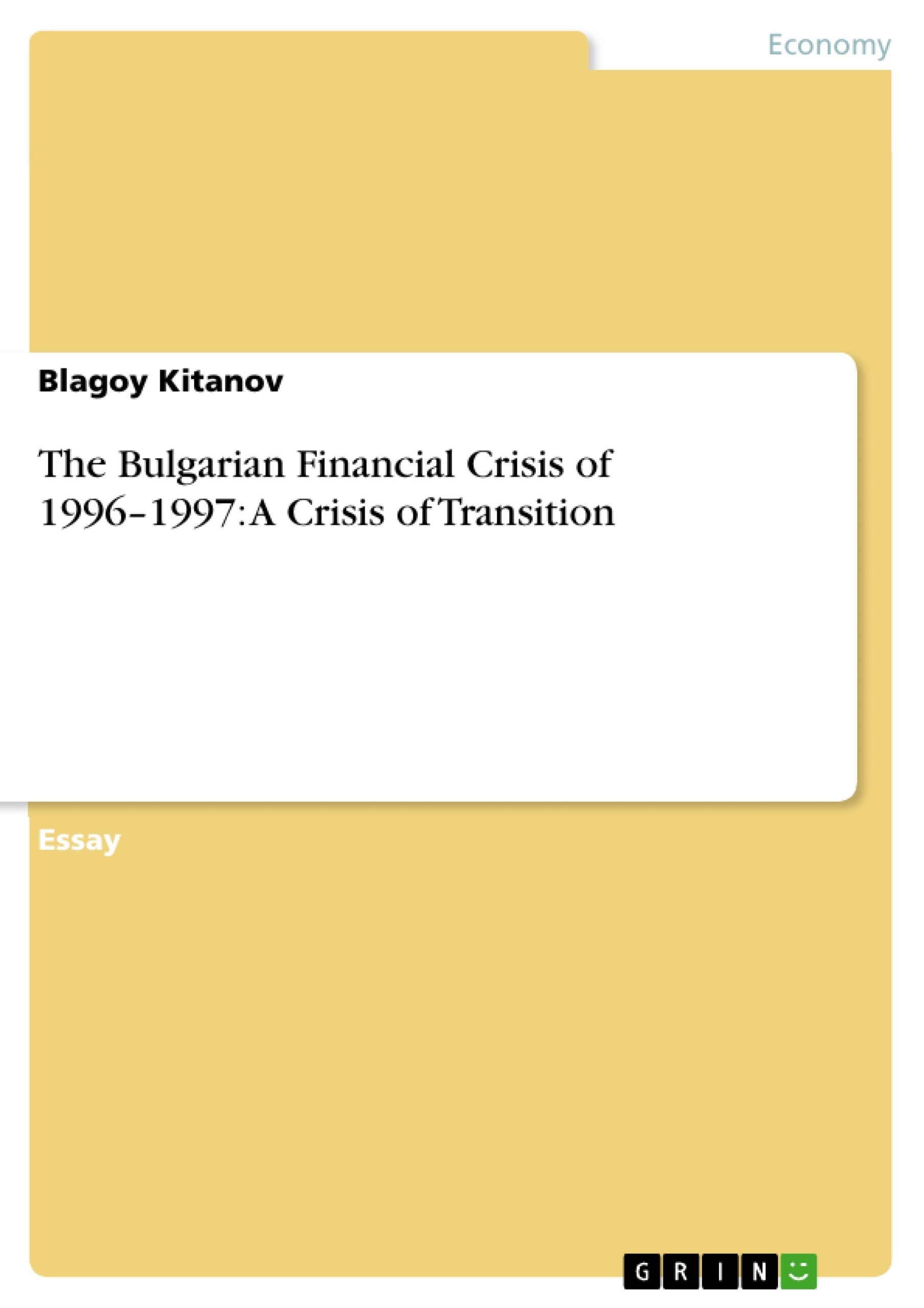Since the fall of communism in the end of 1989 Bulgaria has been experiencing severe economic difficulties. In 1996 the problems of the country’s transition culminated in one of the most severe banking and currency crises in Eastern Europe – the Bulgarian financial crisis of 1996-1997. The main objectives of this paper are to outline the structural vulnerabilities that led to the crisis, to identify the key characteristics of the “twin” crisis and to analyze the rent-seeking nature of Bulgarian transition.
I will argue that the crisis was an outcome of a moral hazard problem in the Bulgarian economic agents’ behavior and the inadequate and unsustainable policies of the government in the period 1990-1997. The legacies of state-controlled economy were too slow to be overthrown and structural reforms were by and large not implemented up until 1997.
Inhaltsverzeichnis (Table of Contents)
- Introduction
- Economic and Institutional Background: 1990 – 1996
- The Twin Crisis: 1996 - 1997
- The Solution: Currency Board Arrangement
- Analysis of the causes of the crisis
Zielsetzung und Themenschwerpunkte (Objectives and Key Themes)
This paper aims to analyze the Bulgarian financial crisis of 1996-1997, identifying the structural vulnerabilities that led to the crisis, characterizing the "twin" crisis, and exploring the rent-seeking nature of Bulgaria's transition.
- The impact of the fall of communism on the Bulgarian economy
- The role of state-controlled enterprises and their influence on economic agents' behavior
- The development and consequences of the banking and currency crisis
- The implementation of a currency board arrangement as a solution to the crisis
- The analysis of moral hazard as a contributing factor to the crisis
Zusammenfassung der Kapitel (Chapter Summaries)
- The introduction outlines the paper's objectives and argues that the Bulgarian financial crisis was the result of a moral hazard problem stemming from government policies and economic agents' behavior. It highlights the slow pace of structural reforms and the legacies of state-controlled economy.
- The chapter on economic and institutional background examines the unfavorable situation in Bulgaria at the start of the post-communist transition. It discusses the country's economic integration within the socialist bloc, the collapse of the communist system's impact, the rise of foreign debt, and the challenges of restructuring state enterprises. It also touches upon the role of government subsidies, inflation, and the persistent patterns of behavior among economic agents.
- The chapter on the twin crisis describes the events that unfolded in 1996 and 1997, focusing on the banking and currency crises and their interconnected nature. It explains the reasons for bank runs, the government's responses, and the subsequent devaluation of the lev. The chapter also highlights the devastating consequences of the crisis on the banking sector, the economy, and the population.
- The chapter on the currency board arrangement presents the solution implemented by the Bulgarian government to address the crisis. It discusses the introduction of a currency board and its role in restoring confidence in the currency and banking system. The chapter also outlines the government's efforts to strengthen the banking system through new laws and regulations.
Schlüsselwörter (Keywords)
Key themes and concepts explored in this paper include the Bulgarian financial crisis of 1996-1997, transition economies, moral hazard, rent-seeking behavior, state-controlled enterprises, banking and currency crises, currency board arrangements, structural reforms, and macroeconomic stabilization.
Frequently Asked Questions
What caused the Bulgarian financial crisis of 1996–1997?
The crisis was caused by structural vulnerabilities, a moral hazard problem in economic behavior, and unsustainable government policies during the post-communist transition.
What is meant by a "twin crisis"?
A "twin crisis" refers to the simultaneous occurrence of a banking crisis (bank runs and insolvency) and a currency crisis (massive devaluation of the lev).
What role did state-controlled enterprises play in the crisis?
The slow pace of restructuring these enterprises led to persistent government subsidies and bad loans, which ultimately destabilized the banking sector.
How was the financial crisis resolved?
The government implemented a Currency Board Arrangement in 1997, which helped restore confidence in the currency and stabilized the macroeconomic environment.
What is the "rent-seeking" nature of the Bulgarian transition?
It refers to behavior where economic agents seek to gain wealth through political influence and state resources rather than through productive economic activity, contributing to the crisis.
- Citar trabajo
- Blagoy Kitanov (Autor), 2009, The Bulgarian Financial Crisis of 1996–1997: A Crisis of Transition, Múnich, GRIN Verlag, https://www.grin.com/document/155141



